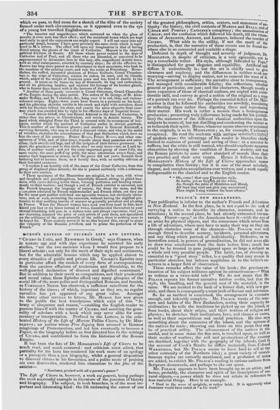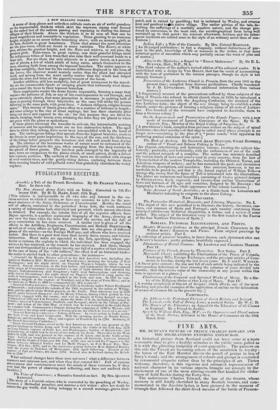POLACK'S NEW ZEALANDERS.
THIS publication is inferior to the author's Travels and Adventures in New Zealand. In the first place, he is not equal to the task of surveying a nation to describe its character, manners' and in- stitutions; in the second place, he had already exhausted hisema- terials. Fluent—spry,* as the Americans have it—with the eye of an artist for physical objects, and the coarseness which arises from a life of adventure, where men have to make their way as they can through obstacles none of the cleanest—Mr. POLACK was well enough fitted to describe scenery, incidents, personal adventures, and any thing which partook of individuality. Defective, as we heretofore noted, in powers of generalization, he did not seem able to draw true conclusions from the facts before him ; much less could he be trusted to pass judgment upon so large a subject as a whole and very peculiar people. The habit, too, of dressing up, essential to a " good story" teller, is a quality that may amuse in particular sketches, but induces scepticism as to the writer's ex- actness in a larger field of observation. These remarks affect the value of his book; the previous ex- haustion of his subject militates against its attractiveness—" What so tedious as a twice-told tale ? ' We do not mean that Mr. POLACK repeats his former narrative totidem verbis, but that the style, the handling, and the general east of the material, is the same. We are treated to the hash of a former dish, with new gar- nish; and there is 'consequently a want both of flavour and substance. So far as method is concerned, the arrangement is extensive enough, and tolerably complete. Mr. POLACK treats of the man- ners and habits of the New Zealanders, noting their capacity for civilization; he tells the traditions he picked up on the island, or from books, about their origin, and their notions of religion and physics ; he sketches their institutions, laws, and classes or castes, as well as their superstitious and social practices. He also says something about the commerce of the island, and the aptness of the natives for trade ; throwing out hints on this point that may be of practical utility. The advancement of the natives in the useful, and in some sense the fine arts, is touched upon, as well as their modes of warfare; the soil and productions of the country are decribed, together with the geography of the islands, (and la the account of Cook's Straits he differs materially from Colonel WAKEFIELD, but Mr. POLACK Seems to have laud to sell at the other extremity of the Northern isle) ' • a great variety of miscel- laneous topics are cursorily mentioned, and a profusion of notes are added, to exhibit Mr. Por.acx's reading in various authors from Scripture downwards, and perhaps to eke out space. Mr. POLACK appears to have been brought up as an artist ; an hence, probably, the character and spirit of his descriptions of na- tural objects,—a power which he does not retain in reference to less material things. Here is an example. " Used in the sense of sprightly, or rather brisk. It is apparently what Jour/sea would have noted as "a /ow word."
A NEW ZEALAND FOREST.
A scene of deep gloom and unbroken solitude casts an air of awful grandeur on the impenetrable thicket!' which skirt the wayvvorn zigzag road formed by the naked feet of the natives passing and repassing in visiting the distant villages of thew friends. friends. Above the thickets is to be seen all that can be
i
found magnificent and venerable n vegetation. Trees growing to an immense height, straight as an arrow before branching above, with an amazing girth at the base, flourish in great luxuriance. Those that attract the most attention are the pine-trees, which are found in many varieties. The Kauri, or white pines attains the greatest height, and the Rata and totdrra, or red pine, the retest girth. Palm-trees, in great variety, rear their graceful foliage amid the indigenous tribes of fern-trees that also raise their well-crowned heads to a large size. Nor are these the only adjuncts to a native forest, as a parasite race of plants, a few of which admit of being eaten, attach themselves to the trees, shooting forth from among the topmost branches. The union appears so far from unsightly, that but for the extreme difference displayed in the form of the leaves, the observer would scarcely notice that the plant had obtruded itself, and sprung from the scant earthy matter that the winds had lodged within the arms and boles of the gigantic tenants of the forest.
Another addition, still less unsightly, but of great annoyance to the travel- ler, are the innumerable liands or creeping plants that tortuously wind them- selves round the trees to their topmost branches. These supplejacks render the dense threats impassable, forming a maze that requires the patience of Job, or any of his contemporaries to cut through, and are so extremely elastic, that some precaution is necessary in quitting hold of them in passing through these labyrinths, as the cane will strike the person following in the same path, with great force. " Arduus obliquus, caliginedensus open." This tracery of bands grows often to a number of fathoms in length ; sad some enlarge to the size of stout saplings, but lose their elasticity after being cut down and exposed to the air : for this purpose they are fitted for wheels, hoping, boats' knees, even retaining the form they are placed in when cat green with the plane or spokeshave. It these plants intercept the traveller in mid-air, the interminable matting of immense and far-spreading roots are no less obstructive below. The aged trees to which they belong, have never been intermeddled with by the hand of man. The umbrageous foliage that spreads from the highest branches, renders the forests in most parts impervious to the rays of the sun, and the thickness of the foliage below prevents the luxurious and rich soft mould from drying up. The admirer of the beauteous works of nature must be entranced at the calm placidity that meets the eye, when emerging from the deep recesses he has passed of forest gloom. The loveliest park arranged by the ingenuity of man, bears no comparison to the plains which, of small extent, divide a forest into separate portions. The surfaces of those spots are diversified with clumps of ever-verdant trees, and the gently-rising downs, enclosing between them those running brooks of cold pellucid water that gratefully cherishes the weary wayfarer.



























 Previous page
Previous page